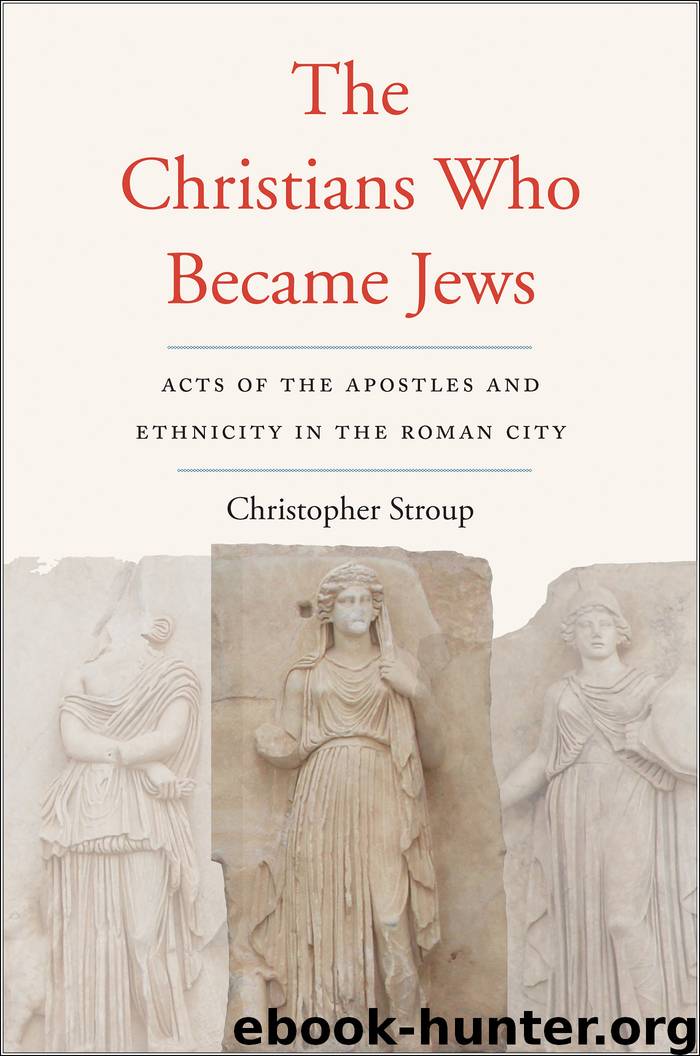The Christians Who Became Jews by Christopher Stroup;

Author:Christopher Stroup;
Language: eng
Format: epub
Publisher: Yale University Press
Published: 2020-07-23T16:00:00+00:00
THE ONES WHO TURN THE OIKOUMENĒ UPSIDE DOWN
The Salutaris Foundation carefully regulated the physical movement of Artemis and her entourage through Ephesus. Similarly, Luke regulates Paul’s literary movements in Acts. While the Salutaris Foundation created a pattern of processions that physically transferred images of Artemis and others from the Artemision through the polis and back to the goddess’s temple, Luke creates two overlapping literary patterns with regard to Paul’s movements. Throughout Acts, Paul’s movements revolve around his departure from and return to Jerusalem.43 This pattern is perhaps most strikingly illustrated in the fact that Luke does not complete it at the ending of Acts.44 Acts ends with Paul in Rome.
A second pattern emerges while Paul is away from Jerusalem, as Wills has observed:45 Paul enters a city, finds the Jewish community there, and after facing opposition departs from the Jewish association to form a new community. Just as each of the movements of Artemis through Ephesus unified Ephesian identity in a particular way, I argue that each of Paul’s movements in individual cities unifies Christian identity in a particular way. Moreover, just as the exclusion of the Kouretes from Salutaris’s processions privileged one way of being Ephesian over others, Luke’s depiction of opposition to Paul by some Jews privileges one way of being Jewish in the polis over others.
According to the writer of Acts, as Paul, Silas, and Timothy are strengthening the Christian assemblies in the poleis around Lystra, the Holy Spirit guides them on their way (16:6). They depart for the regions of Phrygia and Galatia, having been forbidden by the spirit of Jesus from entering Asia (16:6). From there they travel to Mysia (16:8–11) and on to Macedonia. While in Philippi, a leading city of Macedonia, the owners of a slave girl with a Pythian spirit accuse Paul and Silas of disturbing the polis because they are Jews and advocating customs that are not permitted for Romans “to adopt or to do” (παραδέχεσθαι οὐδὲ ποιεῖν) (16:20b–21). After the two men are beaten and thrown into prison, Luke turns the slave masters’ accusation on its head by revealing that these Jews are also Romans (16:37–38).46 The Roman magistrates (στρατηγοί) who threw them in prison are forced to apologize to Paul and Silas and then ask them to leave the polis (16:39).
From Philippi, Paul and Silas continue their divinely inspired travel to Thessalonica, where Paul locates the Jewish association and, “as was his custom” (κατὰ τὸ εἰωθὸς), joins their weekly meetings to discuss the Jewish sacred texts (17:1–2). There he argues that Jesus is the Christ (17:3). Paul persuades some Jews along with some God-fearing Greeks and leading women to join him and Silas (17:4). This causes jealousy in some Jews, and so they gather a group of ruffians from the agora and stir the polis into an uproar (17:5). Since they cannot find Paul and Silas, they drag a previously unmentioned Jason and some other Christians before the city rulers. The mob proclaims, “These ones who turn the oikoumenē upside down have also come here, and Jason welcomed them.
Download
This site does not store any files on its server. We only index and link to content provided by other sites. Please contact the content providers to delete copyright contents if any and email us, we'll remove relevant links or contents immediately.
| Anthropology | Archaeology |
| Philosophy | Politics & Government |
| Social Sciences | Sociology |
| Women's Studies |
Mysteries by Colin Wilson(2883)
People of the Earth: An Introduction to World Prehistory by Dr. Brian Fagan & Nadia Durrani(2344)
Ancient Worlds by Michael Scott(2098)
Foreign Devils on the Silk Road: The Search for the Lost Treasures of Central Asia by Peter Hopkirk(2050)
The Memory Code by Lynne Kelly(1937)
Lost Technologies of Ancient Egypt by Christopher Dunn(1796)
The Splendid and the Vile by Erik Larson(1779)
Come, Tell Me How You Live by Mallowan Agatha Christie(1761)
The Earth Chronicles Handbook by Zecharia Sitchin(1742)
The Plantagenets by Dan Jones(1610)
Last Chance to See by Douglas Adams(1595)
The Return of the Gods by Erich von Daniken(1569)
Wars of the Anunnaki by Chris H. Hardy(1390)
Before the Dawn by Nicholas Wade(1312)
Keeper of Genesis by Graham Hancock(1277)
The Cygnus Mystery by Andrew Collins(1257)
The Message of the Sphinx by Graham Hancock(1221)
Fragile Lives by Stephen Westaby(1111)
Hieroglyphs: A Very Short Introduction by Penelope Wilson(1032)
